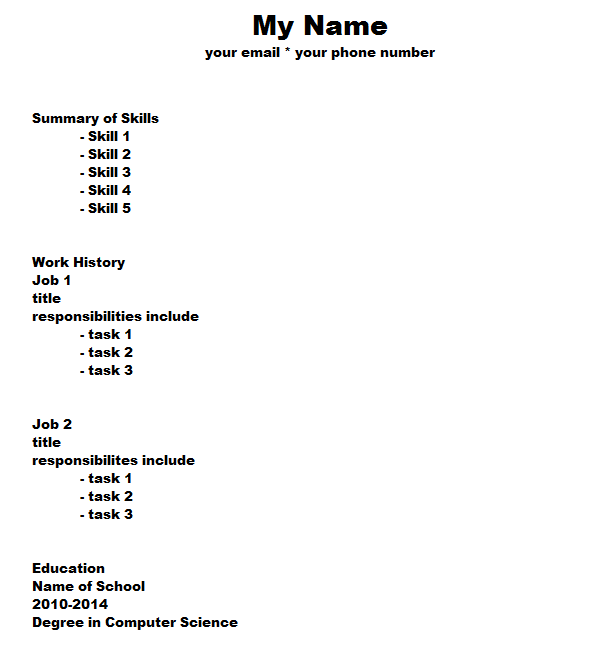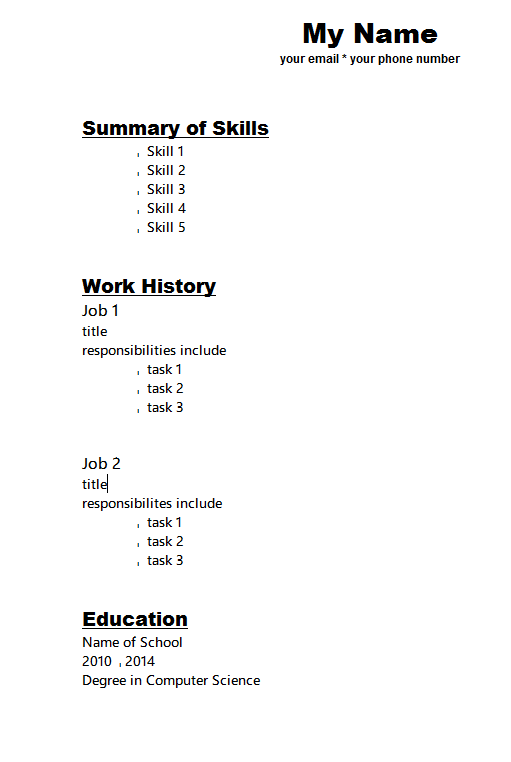I've read tons of articles and how to's on how to write the "perfect resume". And I've followed many of those standards and rules throughout the years myself. Many contradict each other, and many more might not make sense, but people follow those rules because there's not much else to go on really. Then, I started to interview potential candidates at my last job and I realized that all those tips that people pick up make for a really crappy interview. You can tell immediately that the person gets nervous whenever you look at their resume, as if they're hiding some terrible secret. They've spent months crafting the perfect literature and are waiting for the review. Whereas interviewees with colorful and lively resumes are more relaxed and look forward to being questioned about their skills.
I'm not an expert in writing resumes, I've just had plenty of interviews, and I've interviewed a fair amount of people. I've seen some pretty out there resumes and I've written some pretty out there ones myself. And for the most part I don't spend more than 2-3 minutes reading each one, as I already have a pre-defined list of questions ready to ask.
"Avoid Being Too Personal and Honest"
I saw some guy post this on Facebook the other day, then quickly blocked any further communication from him. The article he referenced said something to the effect of "only mention jobs related to the position and remove any section that talks about personal work or abilities". This person agreed, I removed him from the feed. The truth is no one is going to look at your resume, see "Volunteer Work" and then suddenly turn green and rip it. Humans read your resume. Humans like you and me. If you helped feed a village in another country, then I would think most people would see that as a positive thing, regardless of the job. If you worked at a sandwich shop and you're applying for a developer job, let's talk about it for a minute. Those tidbits are what make for an interesting interview. If you list 2 jobs with the same title and the same technical description rehashed I can assure you that interview won't last more than 3 minutes. I think removing any personalization from your resume will lead to a boring and lifeless one that won't stand out from the stack of 20 others someone needs to go through.
Some of my best and longest interviews have revolved around my "Additional Skills" section on my resume, which talks about my development work outside of work done for any corporations. I used to be an active participant in TopCoder back in the day, and I would say that at over 50% of my interviews that topic has come up, and it showed that my interests went above just sitting in a cubicle typing for loops. I was a finalist in Microsoft's Imaging Cup years ago, and that also makes for a more interesting interview.
"Only Use 1 Page Always No Matter What"
This is a popular one. Everyone I know swears by it. Cram your resume into one single sheet of paper neat and tidy and whoever is looking at it will be pleased. And it has a few side effects. One, if you have a fair amount of experience, you're going to end up leaving things out. However, if you don't feel like you should leave anything out, then you're going to use a smaller font, which let's be honest, will annoy anyone that lays eyes on it. Your resume isn't a menu in a restaurant where people pick and choose what they like and what they want to ask you about. It should be a total list of the work you've done in your career, your educational accomplishments and any other work that you would like to emphasize. My resume is currently 2 full pages at a normal font size. And in 10 more years of work, it will be longer than that, it's just the way it is. If you have a stable job history, then your resume should naturally reflect with 2-3 pages. Any more than that, and you've probably jumped around to too many companies, which is the negative part, not that your resume is long.
"Write Every Skill Down You Have Heard of Event If You Don't Know It"
I'm guilty as charged of this one. Right after graduating from college I learned this great "tip" and ended up writing skills of which I had maybe 2 weeks worth of knowledge. It makes your resume look great and makes you look learned. Of course, it just makes you look that way. As soon as people start asking about such skills, things start to go south. Your resume is going to change throughout the years. Skills will be lost, and new ones will be learned and your resume should show that. I get calls for interviews all the time where the recruiter on the other line is looking at a super old copy of my resume and then I have to let them know that I'm not currently seeking work in that field. Not that I'm a huge fan of working with recruiters in any way.
"It Needs To Look Pretty"
About 90% of the resumes that I have submitted I've done so through a plain text upload tool. That's the way companies like it, its easier, more parseable, and they don't have to worry about random broken layouts because your resume can only be opened using this one particular text editing tool. I've had people email me their resumes using proprietary word processing software and I could tell that they spent too much time on layout and design and very little on substance. Font's don't matter but font size might. Not for aesthetic purposes, but for readability.
"It's Okay If It's Ugly"
So it doesn't have to be pretty, but it also doesn't need to look like one giant paragraph. Your contact info should be easy to locate and every section should be ordered by it's importance. Which usually mean, name, email, job history, and education, with any extra stuff down below. You never know how far an employer will read down the page until they are bored, so you must make the top count. Personally, this usually means skipping out on the Objective section, as every single person I know has the exact same one that was copied off the internet.

While it does include all the relevant information, it does so in a way where nothing stands out

Nothing too crazy, and easy on the eyes
While many companies do enjoy 100% plain text resumes for processing reasons and such, at some point in your interview process a human will look at your resume. And while they don't need to see fancy fonts and graphics splashing across the first page, they do need to make sense quickly of what they are looking at. I've seen the sample above far too many times, and it just forces me to highlight and make notes on the entire thing before the interview begins, just so that I can recognize where and what things are.
"Use Action Words"
I'm not even sure what that means. But I've seen it on plenty of websites that emphasize everything else on this list. Essentially they want you to use "verbs". Because when I see that someone "authored" or "compiled" I am impressed. Yes, you should use verbs in your sentences when appropriate. If you're being hired based on the word structure of your resume then there is something wrong, or that's a company that you don't want to work for. For the most part, I normally just look at job title when looking at someones resume. Then I ask them to break down their duties. If they mention SQL, I dive in deeper. If I read "authored majestic sql scripts", it doesn't really make an impact.
Always write a resume that shows off your strongest skills. I update my resume after I leave any job with new skills acquired and I remove any skills that I've either forgotten or that I realize have no interest in. Copies of one of my old resumes still haunt the interwebs to this day, and make up about 60% of all the job related emails that I receive. At the end of the day, you should feel comfortable with what's on your resume. Random interview questions with little meaning are bad enough in an interview, you don't need to add the stress of a resume that's only a half truth.
Walter Guevara is a Computer Scientist, software engineer, startup founder and previous mentor for a coding bootcamp. He has been creating software for the past 20 years.